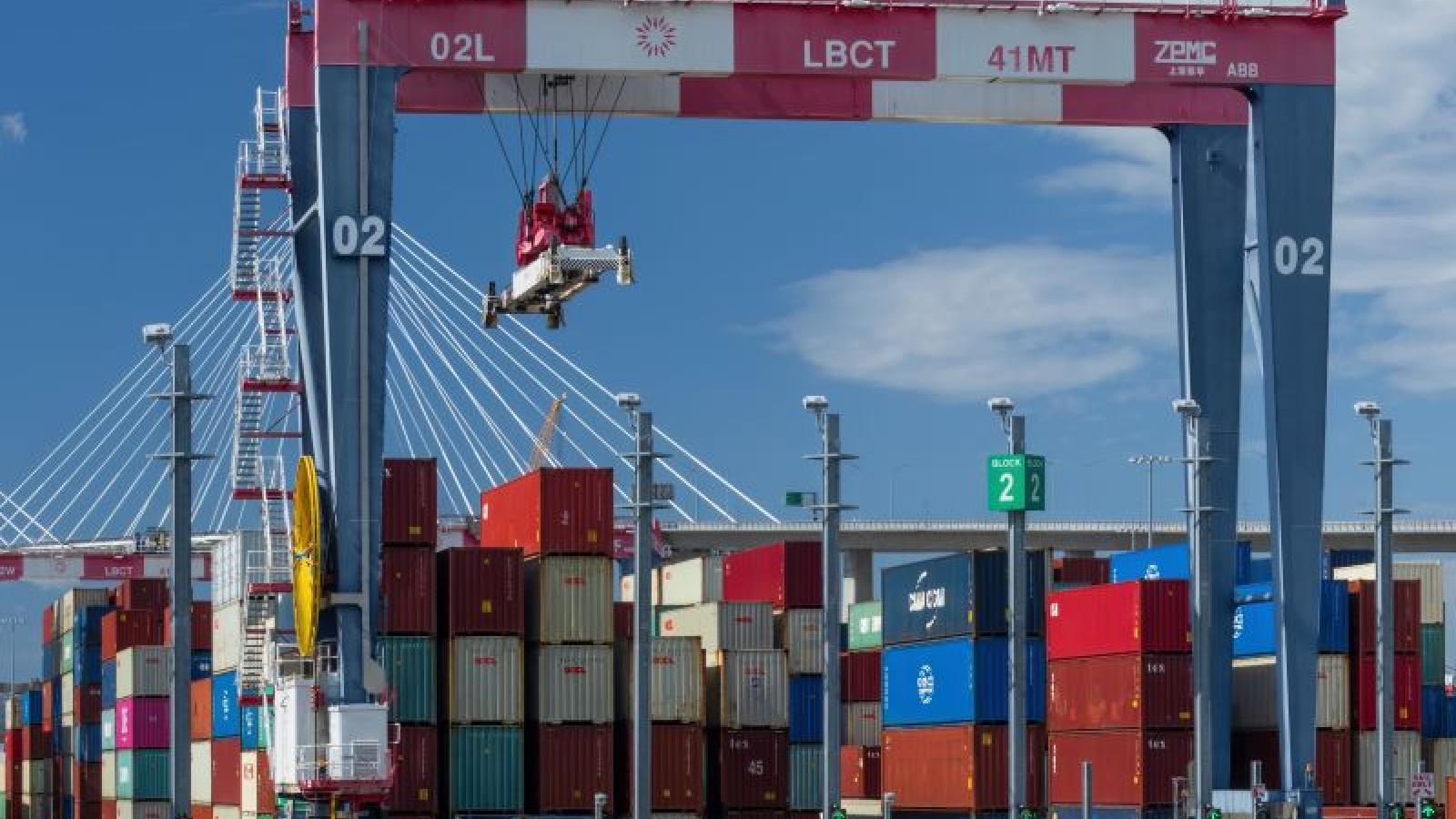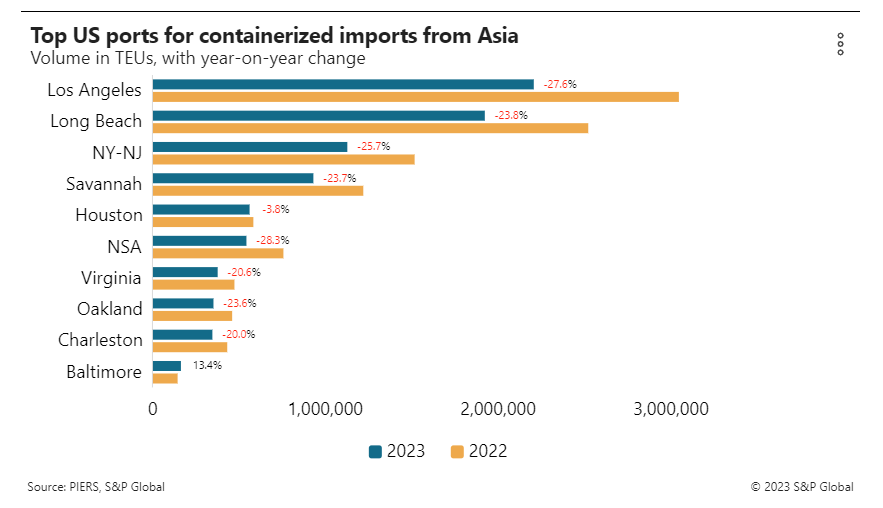
The Pacific Merchant Shipping Association says meeting any new emissions goals may require the use of technology or fuels that are not yet commercially viable.
Port and cargo interests in Los Angeles and Long Beach warn that a pending proposal from the regional air quality board designed to slash transport emissions will effectively “cap” cargo volumes at the largest US port complex and hasten the diversion of discretionary cargo to other ports.
A coalition of more than 100 shipper and transportation interests, in an Aug. 25 letter to the mayors of Los Angeles and Long Beach, urged the officials to oppose the so-called Indirect Source Rule (ISR), which is under development by the South Coast Air Quality Management District (AQMD).
The ISR, which is expected to be finalized by December, is meant to reduce emissions at the ports from all sources. But stakeholders say an unintended consequence of the rule will be to effectively force Los Angeles and Long Beach to put limits on cargo volumes in order to meet the ISR requirements.
“The initial SCAQMD staff proposal essentially establishes volume caps on port activities, which will restrict the delivery of critical imported goods including essential construction, manufacturing and automobile components, as well as medical supplies, and halt the export of California’s manufactured goods and agricultural products to foreign markets,” the coalition said in the letter to the mayors.
But the AQMD has hit back hard, saying the trade community was being “irresponsible” by making assumptions about a proposed rule, the details of which have not been finalized.
“The grossly inaccurate rhetoric being spread by some in the industry is about a proposed rule that is yet to be released,” the agency said. “Conclusions about a rule that has not yet been finished or released is not based on fact and is, frankly, irresponsible.”
Ports say they have good track record on emissions
An “indirect source rule” makes an entity or entities — in this case the Southern California ports and their terminal operators — responsible for reducing emissions that produce health risks and contribute to global warming, even if their operations are responsible for only a portion of the emissions.
AQMD is finalizing the details of the ISR, which is known as Proposed Rule 2304: Indirect Source Rule for Commercial Marine Ports. Transportation interests have latched onto comments made by an AQMD representative at a workshop organized by the agency that limiting cargo volumes in order to reduce emissions from vessels, trucks and trains remains an “option.” The Pacific Merchant Shipping Association (PMSA), which represents ocean carriers and terminal operators, provided the Journal of Commerce with a video clip of the workshop which shows the AQMD official acknowledging, in response to a question, that limits on cargo volumes remains an option.

Mario Cordero, executive director of the Port of Long Beach, noted that the ports have already achieved significant emissions reductions from their joint Clean Air Action Plan, clean-truck programs and other initiatives dating back more than 15 years.
“Why do you want to place additional regulations on two ports with such a resume of success?” he said. Cordero told the Journal of Commerce that Long Beach and Los Angeles have achieved greater emissions reductions than any other US ports.
PMSA also warned that meeting AQMD’s goals may require the use of technology or fuels that have yet to be proven commercially viable.
For example, statistics provided by the ports of Los Angeles and Long Beach show that vessels account for 54% of the total nitrogen oxide (NOx) emissions from all types of transportation modes serving the port complex. However, unlike truckers, who have access to electric vehicles, container ships do not run on electricity, and alternate fuels currently on the market may not produce the emission reductions required in the ISR.
“The problem is, how do you comply with this rule?” Thomas Jelenic, PMSA vice president, said to the Journal of Commerce.
AQMD in January 2022 implemented a similar rule, known as the Warehouse ISR, that requires warehouses to reduce emissions from all sources operating at the warehouses. An importer in the automotive sector said his facility has reduced emissions under its control by adding solar panels, installing electric vehicle charging stations for its employees and purchasing EV yard tractors. The source said he can encourage truckers and other stakeholders to reduce emissions from their operations, but he can go only so far.
“We do have options, but I can’t mandate them,” he said.
The transportation companies and shippers have told AQMD the proposed rule will increase their costs in Southern California and penalties charged to the terminals for exceeding emissions limits will likely be passed on to carriers and their customers.
Jonathan Gold, vice president of supply chain and customs policy at the National Retail Federation, which signed the letter to the mayors of Los Angeles and Long Beach, said retailers are especially concerned that any penalties assessed for exceeding emission reduction mandates will add to the high costs they already experience in Southern California.
“Those costs are going to be passed on to someone, and it will probably be the cargo owner,” Gold said.
AQMD, meanwhile, said it is continuing to discuss all compliance options with the trade community.
“We have discussed preliminary rule concepts with interested stakeholders, including a variety of ways in which the ports can comply ... and are working with them to come up with a proposed regulation that is feasible and can improve air quality without impacting cargo flows,” AQMD told the Journal of Commerce.
Could proposed rule actually increase emissions?
PMSA argues that any higher transportation costs resulting from the proposed rule could end up actually increasing vessel emissions in US supply chains because the discretionary cargo diverted from the West Coast would travel longer distances on all-water services from Asia to the East and Gulf coasts. PMSA said a study by Starcrest Consulting Group — that PMSA commissioned — confirms that assertion.
“GHG [greenhouse gas] emissions are, on average, 19% higher when shipping lines utilize East Coast or Gulf Coast ports over the ports of Long Beach and Los Angeles,” PMSA said in an Aug. 30 statement about the study.
AQMD said the debate surrounding the indirect source rule is not an either/or choice between emissions reductions and economic growth.
“In fact, over the last several decades, South Coast AQMD has proved that we don’t have to trade off clean air for a strong economy,” the agency said. “Over the past 20 years, we’ve cut emissions by over half while continuing to increase our population and growing the region’s gross domestic product.
“We continue to work with stakeholders who are interested in working with us,” it added. “It is disappointing that, to date, the ports have chosen to not engage in this rulemaking.”

